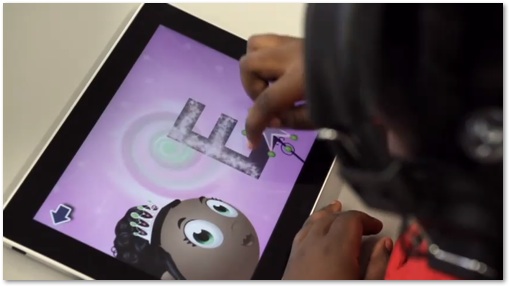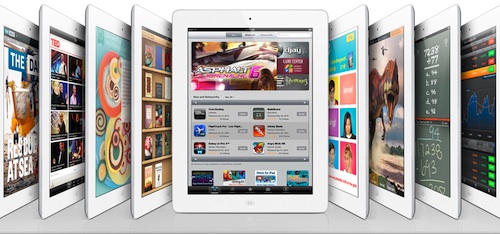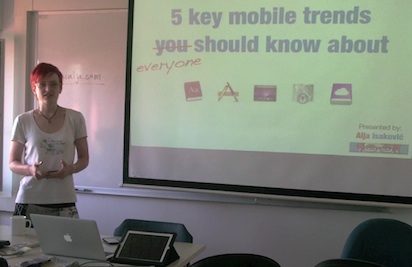5 key mobile trends you should know about [Lecture]
Recently I was invited to prepare a guest lecture for a small group of business and management students attending an E-learning course as part of their Summer School in Koper. I was told to choose a topic that would be fresh, something that students don't get to hear about that often in regular classes.
Lecture slides with additional resources
Because choosing just a few trends, just a few technologies wasn't easy, I decided to prepare slides that students could also use to explore parts of the lecture they found most interesting in more details. That is why I added a lot of links to current articles with cases studies, stats, analysis and what not. You can view all of the slides embedded below.
Don't like flipping through slides? Here's a recap.
To sum it all up in a more coherent form, here are the 5 key mobile trends I decided to highlight:
1. Mobile devices are making learning (and other activities) more magical
Interactive content is nothing new. What is new is the way mobile devices such as smartphones and tablets (that include smart sensors and touch screens) allow us to physically touch the content. It does feel a bit like magic, touching just isn't the same as clicking with a mouse. It's more intuitive, more personal. It gets to you.
And while today apps like Our Choice are often seen as fun gimmicks that you can use to impress an audience, I believe that in a few years we'll wonder how we've ever settled for learning with content we couldn't touch directly. Ok, make that a couple of more years; we all know most edu folks aren't exactly early adopters. But I believe that someday the shift will happen, because touch just feels so natural to all of us.
2. Apps and app stores are rocking the world
There certainly is an app and an app store for that - whatever your "that" might be. Apart from satisfying our desire to help angry birds get revenge on those naughty, egg-stealing pigs, mobile apps (and the development ecosystem Apple envisioned) are teaching everyone some important lessons. There are many reasons why apps are so successful. The most obvious one is because they are just so much more awesome and magical, if you will, than our desktop software.
But another very important lesson (one that Apple already learned with the iTunes Store) is that we don't mind paying for digital content if it's easy and convenient to do so and if the content provides us with enough value. And, on the other side of the fence, we are eager to develop good content if we get the chance to earn a few bucks and be the coolest kid in town aka the app store of our choice.
The application stores are also making business models that rely on selling virtual content (in-app purchases) more popular and widely acceptable. I don't think I'm stretching it too far if I predict that in a few year we'll be spending 99 cents on fancy templates for Microsoft Office. Right within the software, or app, as we'll all be calling it by then. One click, ka-ching! Of course, Apple will probably the first one to offer in-app purchases in Pages ;) Which all leads us to the next trend...
3. Website and desktops are changing because of mobile devices
Mac OS X Lion, which will hopefully be released in a week or so, looks like iPad's big brother. Full screen apps, a new app launcher, the Mac App Store, heavily integrated gestures... Yep, Apple has learned a lot from iOS, their mobile operating system, and it's bringing most of it (including the App Store business models) to their big, desktop OS.
And don't think this is just an Apple fad - Windows 8 will also look like Windows Phone 7's big brother. It seem like we've got no choice but to adapt to seeing our desktops becoming some sort of clumsier mobile device with a big screen.
Not to mention websites also all want to look like apps. And HTML5, CSS3 & co. will make that all possible. Expect to see more websites that look and behave like apps or at least websites that will be smart enough to have the decency to self adjust to your screen size and even device type. I sure do hope to see more responsive design on the web in the coming years.
4. Location data makes mobile better
Ugh, location. Where to start? It's pretty clear that adding location data can make many services more useful and even fun. From local searches that help you discover cool nearby places, to the phenomena of telling all your friends not just what you're doing, but also where you're doing it and getting specials or offers in return, mobile payments and mobile commerce taking off, geo-fences that enable location reminds, ad-hoc social networks based on location, and... and... and...
There is A LOT going on, so I really suggest you take a look at some of those additional links provided in the slide deck above. There's no doubt that relying on location data to enhance services is a big trend that is just starting to evolve. As a side note, it is of course also worth noting that we have a lot of open questions about privacy and trust to figure out yet, especially when it comes to sensitive location data.
5. The cloud will make everything easier
As more and more companies expect us to have more and more of their devices of different sizes and shapes, it's a bit of a relief that they are also thinking about ways of connecting all our devices and making up for our instinctive human laziness when it comes to backing up and syncing. The new wave of cloud services from all the big boys are all trying to making it easy for us to access our content, data and files from any of the devices we own.
And while most people, who today know very well computers just aren't to be trusted, are still skeptical of all these promises (it does look a bit like science fiction, doesn't it?), I think in a few years we'll all get adjusted to things just working seamlessly through the cloud.
And that is probably the master trend to rule them all - the technology is slowly getting out of the way, fading in the background, while allowing us to be the forgetful, spontaneous, touch fixated human beings that we all are. In this world, experience is the killer app.
Prefer video to text? No problem, look over here!
If you prefer to listen to me go through these key points and watch me passionately gesticulate as an added bonus, you can also take a look at the video recording from the lecture on YouTube (I do apologize for a few minor technical glitches; an hour long HD video is apparently quite a big bite for my good old iMac to swallow).
As always, you are more than welcome to leave your comments, questions, likes, tweets, +1's and what not. All feedback is appreciated!
Originally published at http://ialja.blogspot.com/2011/07/5-key-mobile-trends-you-should-know.html
And that's why I decided to put together an overview of some of the key trends in the mobile industry that are already influencing the way we study, work and socialize, and will probably be an increasingly important part of our day to day life. You can find the slides and the video of my lecture, as well as a text recap, in this post.
Lecture slides with additional resources
Because choosing just a few trends, just a few technologies wasn't easy, I decided to prepare slides that students could also use to explore parts of the lecture they found most interesting in more details. That is why I added a lot of links to current articles with cases studies, stats, analysis and what not. You can view all of the slides embedded below.
Don't like flipping through slides? Here's a recap.
To sum it all up in a more coherent form, here are the 5 key mobile trends I decided to highlight:
1. Mobile devices are making learning (and other activities) more magical
 |
| The magic of touch (source: Apple) |
And while today apps like Our Choice are often seen as fun gimmicks that you can use to impress an audience, I believe that in a few years we'll wonder how we've ever settled for learning with content we couldn't touch directly. Ok, make that a couple of more years; we all know most edu folks aren't exactly early adopters. But I believe that someday the shift will happen, because touch just feels so natural to all of us.
2. Apps and app stores are rocking the world
 |
| The App Store has over 400,000 apps (source: Apple) |
But another very important lesson (one that Apple already learned with the iTunes Store) is that we don't mind paying for digital content if it's easy and convenient to do so and if the content provides us with enough value. And, on the other side of the fence, we are eager to develop good content if we get the chance to earn a few bucks and be the coolest kid in town aka the app store of our choice.
The application stores are also making business models that rely on selling virtual content (in-app purchases) more popular and widely acceptable. I don't think I'm stretching it too far if I predict that in a few year we'll be spending 99 cents on fancy templates for Microsoft Office. Right within the software, or app, as we'll all be calling it by then. One click, ka-ching! Of course, Apple will probably the first one to offer in-app purchases in Pages ;) Which all leads us to the next trend...
3. Website and desktops are changing because of mobile devices
 |
| Apps in Mac OS X - looks familiar, doesn't it? (source: Apple) |
And don't think this is just an Apple fad - Windows 8 will also look like Windows Phone 7's big brother. It seem like we've got no choice but to adapt to seeing our desktops becoming some sort of clumsier mobile device with a big screen.
Not to mention websites also all want to look like apps. And HTML5, CSS3 & co. will make that all possible. Expect to see more websites that look and behave like apps or at least websites that will be smart enough to have the decency to self adjust to your screen size and even device type. I sure do hope to see more responsive design on the web in the coming years.
4. Location data makes mobile better
 |
| Even Facebook is crazy about Places (source: Facebook) |
There is A LOT going on, so I really suggest you take a look at some of those additional links provided in the slide deck above. There's no doubt that relying on location data to enhance services is a big trend that is just starting to evolve. As a side note, it is of course also worth noting that we have a lot of open questions about privacy and trust to figure out yet, especially when it comes to sensitive location data.
5. The cloud will make everything easier
 |
| Don't worry, the cloud will take care of everything (source: Wikipedia) |
And while most people, who today know very well computers just aren't to be trusted, are still skeptical of all these promises (it does look a bit like science fiction, doesn't it?), I think in a few years we'll all get adjusted to things just working seamlessly through the cloud.
And that is probably the master trend to rule them all - the technology is slowly getting out of the way, fading in the background, while allowing us to be the forgetful, spontaneous, touch fixated human beings that we all are. In this world, experience is the killer app.
Prefer video to text? No problem, look over here!
If you prefer to listen to me go through these key points and watch me passionately gesticulate as an added bonus, you can also take a look at the video recording from the lecture on YouTube (I do apologize for a few minor technical glitches; an hour long HD video is apparently quite a big bite for my good old iMac to swallow).
As always, you are more than welcome to leave your comments, questions, likes, tweets, +1's and what not. All feedback is appreciated!
